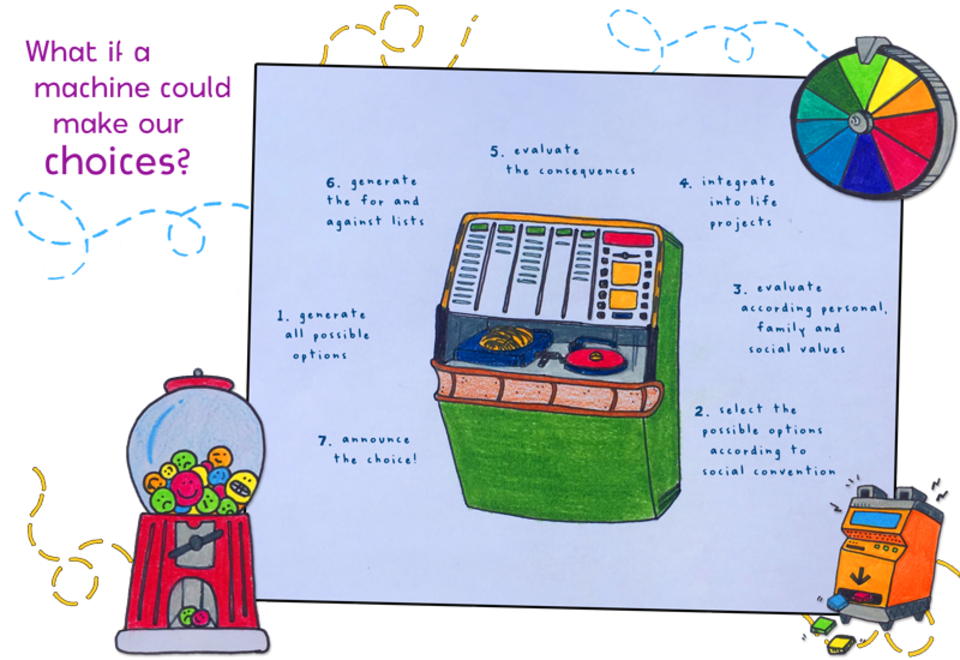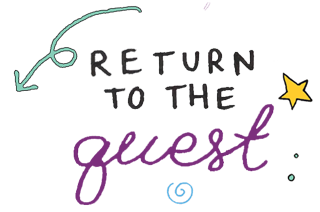
The choice dispenser (Part 2)
You are now at the second part of your creative project! If you have already finished the first part—Creative Conception—you can continue your quest with this activity. But if you haven't finished the first part yet, then start with that one, then you can come back here.
...
| Objective: To create the amazing choice dispenser you imagined! |
Duration: 60 to 90 minutes
Material:
- A sheet of paper or a piece of cardboard
- Pencils and eraser
- Coloured pencils and markers
- Scissors, glue, arts and crafts materials
Instructions:
- Reread your sheet. Take a moment to reread your ideas and review your Creative Conception draft. This will refresh your memory and maybe even give you some new ideas before you get into the final part of your project.
- Create the choice dispenser. Here we go! It's time for you to create the amazing choice dispenser you imagined! On a new piece of paper or on a large cardboard—if you need more space to bring your ideas to life—draw the dispenser with all your talent and care, then add colour to showcase your creation! If you'd like, you can also write a short instruction manual explaining how the dispenser works and what it does.
- Variation: If you'd like, instead of drawing the choice dispenser, you can make it! To do so, you can use recyclable materials, glue and paint.
- Think about your creative experience. Finally, after you have finished, you can ask yourself: How did it go? Did you succeed in realizing the vision you had at the beginning?
- Conception: Does your creation represent what you believe choice is and what you think decision making involves? How do your creative choices reflect your perspectives on the concept?
- Application: What lessons can be learned from your interpretation? Is it possible to always make good decisions? Do we always have a choice? Why or why not?
- Alternative: What could you have changed? Are there nuances that you didn't include? Does the choice dispenser offer the best choices for everyone... in every situation? Are the choices equally distributed—does everyone have the same ability, or opportunity, to make choices? Why or why not?
You can write your answers on the back of your conception sheet to keep track of your evolving thoughts.
...
Bonus: To play a little more with the concept of choice, play a game of "this or that." You can play alone, or invite someone to join the game! This game consists of offering two divergent options to a person who must then choose the option they prefer, and then offer reasons to justify their choice. Here are some questions to contemplate:
One could say that this game presents false dilemmas: a kind of thinking error—also known as a fallacy—which consists in offering only two opposing options while omitting any other alternative. Hmm... is it really a choice if the options are limited or if we don't know all the options? Can you force someone to make a decision? Why or why not? |

| Tricks for tots: Draw the dispenser you imagined in your Creative conception, then ask yourself the following questions: are there any decisions you would never let a machine or anyone else make in your place? Are some people better at making decisions than others? Is it important to make your own choices? Do we sometimes need help to make good choices? Why or why not? |
| Tips for teens: Maybe the choice dispenser you invented is programmed to take into account your talents, tastes, values, aspirations, resources and position in society. Considering all these elements can indeed help you make good decisions... for yourself! But what about the choices you need to make for an entire society? Choosing how to allocate resources and work, for example? Or choosing which values and rules to follow? In A Theory of Justice, the philosopher John Rawls states that societal choices must be made imagining that you are behind a "veil of ignorance," i.e. without knowing any information about your position in that society, so as to not be influenced by your own interests. Hmm... Do individual choices necessarily conflict with societal choices? Can ignorance help us make good decisions... or is it better to rely on education? Hmm... but is it even possible to disregard your position in society and be completely impartial? Why or why not? |
Share your creative reflections by sending them via email.
Include photos of your projects and notes of your thoughts, as well as your first name and your age!


